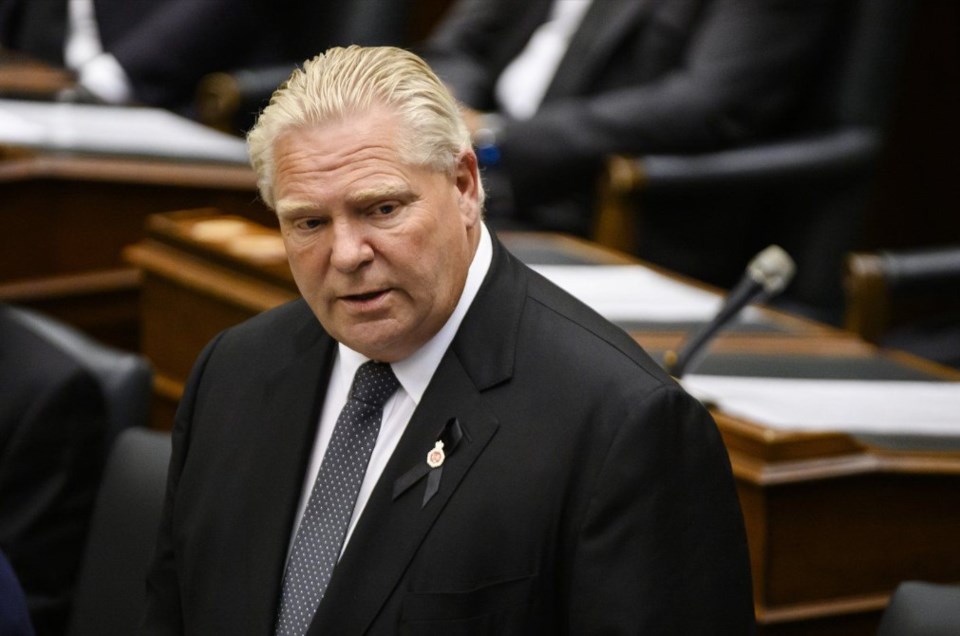EDITOR’S NOTE: This article originally appeared on The Trillium, a new Village Media website devoted exclusively to covering provincial politics at Queen’s Park.
As Premier Doug Ford has defended himself from questions about the stag and doe he hosted for his daughter, he's held up the province's integrity commissioner like a shield.
"I went to the integrity commissioner and he cleared it 1,000 per cent — not 999 — 1,000 per cent,” he told reporters on one occasion. He and his ministers have repeated a similar message in the house and before the press when asked about the wedding fundraiser.
Some of the public's anger over the controversy has spilled over onto the commissioner, J. David Wake.
According to one legal expert who has worked in the commissioner's office, that anger is understandable but misplaced.
Ian Stedman, an assistant professor at York University's School of Public Policy and Administration who worked in the integrity commissioner's office from 2011 to 2014, told The Trillium that the Members' Integrity Act — the provincial law that applies to the integrity commissioner's office and MPP ethics — hasn't kept up with the public's expectation of how public officials should behave.
"To say that something doesn't violate the legislation is no longer the same as saying that it doesn't violate the norms that society holds for MPPs — those things are disconnected now," said Stedman. "That's why everyone gets mad at the integrity commissioner because they think the integrity commissioner has some sort of authority to make sure everyone's ethical. But the integrity commissioner's authority is only what they're given in that legislation."
For instance, Stedman said he believes the public allegations about the stag and doe — that lobbyists and developers with financial interests in government decisions paid to attend, financially benefiting Ford's daughter — aren't likely a violation of the Members' Integrity Act.
One key reason is a politician's independent adult children aren't captured by the law, he said. While Ford's family appears to be quite close, some politicians have little contact with or control over their adult children and the law takes that into account.
Secondly, the act only kicks in when an MPP is in an actual conflict, where they acted to put their private interest above the public interest, rather than merely an apparent one.
"The idea that it looks like a conflict isn't covered by the legislation," he said.
The law says an MPP is in an actual conflict if they take part in a decision to further their own interest or "improperly" further someone else's interest, and it bars them from influencing others' decisions in the same way.
"The 'improperly' part does a lot of work," Stedman said, explaining that it means the politician has circumvented the regular process for the government business in question.
For example, if a politician interferes with the impartial process for awarding a contract and hands it to a friend, it's against the law, but the suspicion that something like that could have happened isn't enough, he said.
"You really have to show that someone made a decision, went one way versus the other, and put their private interests before their public duties," he said.
That said, Stedman believes the public's expectations tend to be higher.
"As a public, we judge our politicians now on their ability, not only to avoid actual conflicts but to avoid putting themselves in a position where it looks like they might benefit, or where the public trust in a process can be diminished as a result," he said.
Stedman wants to see the law changed to reflect that. He also wants to see the integrity commissioner empowered to launch investigations on their own or based on complaints from the public. Wake's federal counterpart has this power, but Ontario's legislation does not allow it: he can only launch investigations into complaints from MPPs.
Without that, the commissioner can be hamstrung. For instance, if he were to become aware of some wrongdoing by a politician — such as, in the course of an investigation of a lobbyist, something that also falls under his purview — he could not launch an investigation into the politician involved unless another MPP was also aware of it and made a complaint, nor could he make it public, Stedman said.
The integrity commissioner may yet investigate Ford over the stag and doe and the wedding.
The opinion he offered is not a full investigation. Usually, an MPP seeks an opinion prior to an event so it can be used as a "get-out-of-jail-free card" later: if a complaint is eventually made, the office won't investigate as long as the facts given ahead of time remain true, said Stedman.
In Ford's case, he only sought the integrity commissioner's opinion months after the fact, and only after a reporter who now works for The Trillium began asking questions. The complete scope of the facts the premier's office gave the commissioner is also unclear.
NDP leader Marit Stiles has launched a complaint and the commissioner has yet to announce whether or not he'll pursue it. If he does, it could result in a robust investigation with interviews of Ford and his inner circle about what the premier did or didn't know, said Stedman.
Whether or not that happens, Stedman still believes the province's ethics regime needs to be strengthened.
"It's in those perceived conflicts that the public starts to become cynical and lose its trust in government," he said. "And that's really the fall of democracy, right? When we all don't trust our public officials. So we need to keep the standards high and right now they're a little lagging, as far as what those regimes should be doing and expecting of our public officials."
